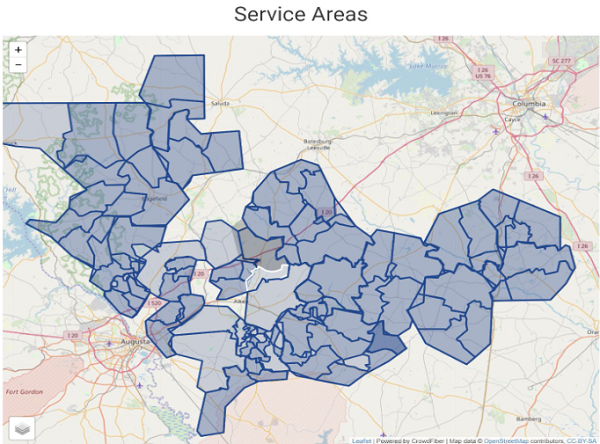
Fast, affordable Internet access for all.

Local electrical cooperatives say they’re making inroads on efforts to finally bring affordable gigabit fiber connections to long neglected portions of rural South Carolina. Dubbed Carolina Connect, the alliance between Aiken Electric Cooperative, Newberry Electric Cooperative and Mid-Carolina Electric Cooperative is doing what cooperatives across the nation have taken the lead on in recent years in the rural areas many serve: filling the gaps left by regional telecom monopolies disinterested in finishing the job.
Aiken’s website indicates that the cooperative coalition has delivered broadband to more than 14 towns and cities, is currently in the process of bringing broadband to eight more, and has five additional communities in the planning stage. According to the Aiken Standard, the coalition has laid about 6,000 miles of fiber within the nine counties served by Aiken Electric alone; predominantly rural markets spread across the Southwest part of the state.
The deployment is not only delivering broadband to many residents for the first time ever, it’s delivering the kind of affordable pricing locals have never seen, thanks to a notable lack of regional competition between regional telecom monopolies like Breezeline (formerly Atlantic Broadband) and AT&T.

Carolina Connect currently offers local residents symmetrical 350 megabit per second (Mbps) service for $50 a month; symmetrical 700 Mbps service for $70 a month, or symmetrical gigabit per second (Gbps) service for $90 a month. Unlike many giant regional ISPs, the cooperative coalition’s service plans have no usage caps, hidden fees, or long-term contracts.
Aiken Electric Cooperative currently serves around 46,000 electric customers in a nine-county area. The co-op says it’s currently in the middle of a massive project, funded by more than $8.6 million in various state and federal grants, to run 350 miles of 288-strand fiber optic cable connecting Aiken Electric’s four offices, 27 substations and all co-op infrastructure.
As of May, the co-op said it was about 70 percent done with the $100 million fiber expansion project, which it states should be completed by the end of the year. Once that first phase is complete, Aiken says it will focus its attention on bringing broadband access to local electricity customers who’ve never been connected to high speed Internet.

In addition to Carolina Connect, Aiken also recently joined forces with ten other cooperatives to form the Broadband Cooperatives of South Carolina. Similar cooperative partnerships have also taken shape across the border in North Carolina.
Like most cooperatives, the coalition’s ambitions closely mirror early efforts to electrify rural segments of America long neglected by regional private sector utilities.
“Just as it was unfair in the early 20th century to ask folks to live without electricity, it’s unfair to ask folks today to live without high-speed internet,” Mike Couick, president and CEO of The Broadband Cooperatives of South Carolina told the Aiken Standard.
“People are tired of living in the digital dark age. We believe these largely rural areas have been left behind for far too long. We are here to help.”
U.S. cooperatives currently serve around 42 million Americans, including 92 percent of counties facing persistent poverty. Such counties are particularly prone to broadband underinvestment by the nation’s biggest, most politically powerful, telecom monopolies, despite decades of heavy taxpayer subsidization.
Enter cooperatives, who continue to piggyback on their century old rural electrification efforts to once again provide affordable broadband to long-neglected corners of the country.
Inline image of S Boundary Ave in Aiken, SC courtesy of Flickr user Carlfbagge, Attribution 2.0 Generic (CC BY 2.0)
